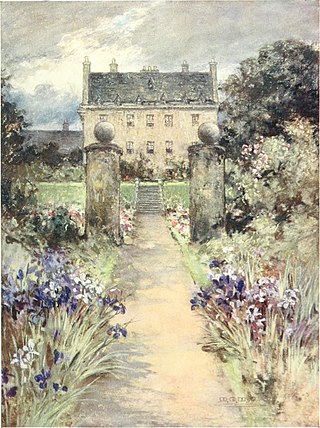
The flag of Scotland is the national flag of Scotland, which consists of a white saltire defacing a blue field. The Saltire, rather than the Royal Standard of Scotland, is the correct flag for all private individuals and corporate bodies to fly. It is also, where possible, flown from Scottish Government buildings every day from 8:00 am until sunset, with certain exceptions.

The Scotland Act 1998 is an Act of the Parliament of the United Kingdom which legislated for the establishment of the devolved Scottish Parliament with tax varying powers and the Scottish Government. It was one of the most significant constitutional pieces of legislation to be passed by the UK Parliament between the passing of the European Communities Act in 1972 and the European Union (Withdrawal) Act in 2018 and is the most significant piece of legislation to affect Scotland since the Acts of Union in 1707 which ratified the Treaty of Union and led to the disbandment of the Parliament of Scotland.
A constitutional amendment is a modification of the constitution of a polity, organization or other type of entity. Amendments are often interwoven into the relevant sections of an existing constitution, directly altering the text. Conversely, they can be appended to the constitution as supplemental additions, thus changing the frame of government without altering the existing text of the document.

Rona is an uninhabited Scottish island in the North Atlantic. It is often referred to as North Rona to distinguish it from the island of South Rona in the Inner Hebrides. It has an area of 109 hectares and a maximum elevation of 108 metres (354 ft).

The Ecclesiastical Appeals Act 1532, also called the Statute in Restraint of Appeals, the Act of Appeals and the Act of Restraints in Appeals, was an Act of the Parliament of England.

The Act of Supremacy 1558, sometimes referred to as the Act of Supremacy 1559, is an act of the Parliament of England, which replaced the original Act of Supremacy 1534, and passed under the auspices of Elizabeth I. The 1534 act was issued by Elizabeth's father, Henry VIII, which arrogated ecclesiastical authority to the monarchy, but which had been repealed by Mary I. Along with the Act of Uniformity 1558, the act made up what is generally referred to as the Elizabethan Religious Settlement.

The Indemnity and Oblivion Act 1660 was an Act of the Parliament of England, the long title of which is "An Act of Free and Generall Pardon, Indempnity, and Oblivion". This act was a general pardon for everyone who had committed crimes during the English Civil War and subsequent Commonwealth period, with the exception of certain crimes such as murder, piracy, buggery, rape and witchcraft, and people named in the act such as those involved in the regicide of Charles I. It also said that no action was to be taken against those involved at any later time, and that the Interregnum was to be legally forgotten.

The Act of Uniformity 1551, sometimes referred to as the Act of Uniformity 1552, or the Uniformity Act 1551 was an Act of the Parliament of England.

The Crown and Parliament Recognition Act 1689 was an Act of the Parliament of England, passed in April 1690 but backdated to the start of the parliamentary session, which started on 20 March 1690. It was designed to confirm the succession to the throne of King William III and Queen Mary II of England and to confirm the validity of the laws passed by the Convention Parliament which had been irregularly convened following the Glorious Revolution and the end of James II's reign.

The Habeas Corpus Act 1640 was an Act of the Parliament of England.

Sir Robert Drummond of Carnock was Master of Work to the Crown of Scotland from 1579 to 1583. This was the responsibility for building and repair of palaces and castles. His appointment was made to be "as Sir James Hamilton of Finnart had it."

The Gaming Act 1845 was an Act of the Parliament of the United Kingdom. The Act's principal provision was to deem a wager unenforceable as a legal contract. The Act received royal assent on 8 August 1845. Sections 17 and 18, though amended, remained in force until 1 September 2007.

The Privilege of Parliament Act 1512 or the Parliamentary Privilege Act 1512, commonly known as Strode's Act, is an Act of the Parliament of England. It enacted parliamentary privilege in law, prohibiting any suit or prosecution from being brought or punishment being imposed against any MP or peer for speaking on any matter in parliament.

The Papal Jurisdiction Act 1560 is an Act of the Parliament of Scotland which is still in force. It declares that the Pope has no jurisdiction in Scotland and prohibits any person from seeking any title or right to be exercised in Scotland granted under the authority of the Pope, on pain of proscription, banishment and disqualification from holding any public office or honour.

The Treason Act 1547 was an Act of the Parliament of England. It is mainly notable for being the first instance of the rule that two witnesses are needed to prove a charge of treason, a rule which still exists today in the United States Constitution.

The Interpretation Act 1889 was an act of the Parliament of the United Kingdom that consolidated enactments relating to statutory construction and provided definitions to shorten the language used in acts of Parliament.

An Act of Sederunt is secondary legislation made by the Court of Session, the supreme civil court of Scotland, to regulate the proceedings of Scottish courts and tribunals hearing civil matters. Originally made under an Act of the Parliament of Scotland of 1532, the modern power to make Acts of Sederunt is largely derived from the Courts Reform (Scotland) Act 2014. Since 2013, draft Acts have also been prepared by the Scottish Civil Justice Council and submitted to the Court of Session for approval.














